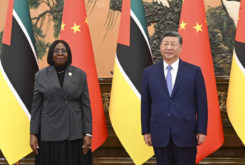Having recently finalized a deal to begin investment banking in Portugal, Bison Capital Financial Holdings of Hong Kong is also moving to Mozambique. It has reached a partnership deal with Geocapital, the bank´s biggest shareholder until now.
According to sources from both Geocapital and Bison, the deal involved an injection of 12 million euros in capital in Banco Mais. It was fully subscribed by Bison, which now has a 48% stake in the Mozambican bank.
Previously the biggest shareholder, Geocapital reduced its stake to 25%. But the deal included an agreement to purchase the stake held by investment fund Africinvest, which, if used, can increase Geocapital´s stake to a level close to that held by Bison.
Until now, according to information still available at the bank´s website, Geocapital had a little over 48%, Africinvest 43%, Gildo dos Santos Lucas 4.20%, Fundação para o Desenvolvimento da Comunidade (connected to former first lady Graça Machel) 2.92% and other shareholders 1.34%.
The commercial bank Banco Mais focuses on the business sector and offers financial solutions to individuals and companies through its network of business units in Maputo, Boane, Xai-Xai, Chimoio and Tete. In Maputo, one of these units is located at AFECC Gloria, a Chinese-built hotel in the capital.
Banco Mais has the title of Special Maputo Stock Market Trader. This allows it to undertake operations at Bolsa de Valores de Maputo and organize financing through the public subscription of subordinated debts, such as commercial paper and corporate bonds.
The bank has also began to broker the negotiation of treasury bills and bonds, and is also a securities custodian agent, supporting companies in registering and joining the stock markets.
Until June this year, Banco Mais had a loss of 35.6 million meticais (US$ 590,000), an improvement from the 2017 loss of over 91 million meticais (US$ 1.5 million), according to its 2018 provisional results, which were recently announced.
Total assets grew to 2.7 billion meticais (US$ 45 million) and the banking margin increased to 41%.
According to CLBrief sources, the bank´s control will be shared between Bison and Geocapital; the current top management team, led by Luis Almeida since 2014, will remain in place.
“The strategy of the bank will be entirely shared between Bison and Geocapital”, according to the same sources.
Geocapital invested in Banco Mais, formerly known as Banco Tchuma, in 2014, through a capital increase, which was also subscribed by the Tunisia-based investment fund Africinvest.
The investment was made after Geocapital sold to Banco Espírito Santo from Portugal, its stake at Moza Banco; its recent financial troubles led to an intervention by the state Bank of Mozambique .
Pedro Cardoso, until recently CEO of Banco Nacional Ultramarino (BNU), Macao — that belongs to the Portuguese state banking group Caixa Geral de Depósitos — joined Bison in July. He will have a key role in the management of Banco Mais.
He will be a member of the board at Bison´s holding company, a position he holds with the presidency of Banif Investment Bank, which Bison acquired, and is currently restructuring.
The European Central Bank authorized in June the acquisition of the investment banking arm of Banif by Hong-Kong based Bison Capital, two years after the initial sale agreement was signed with Oitante, a state-owned vehicle used by the state to intervene at Banif.
While Banif´s retail operation was acquired by Spanish banking group Santander, the Lisbon-based investment banking arm, which last year had a total of 65 staff, was separately sold.
Another Chinese-controlled investment bank is already operating in Portugal – Haitong. This resulted from the acquisition of BESI, the investment banking arm of Banco Espirito Santo. In 2014, the Portuguese state intervened in the bank because it was in financial distress.



